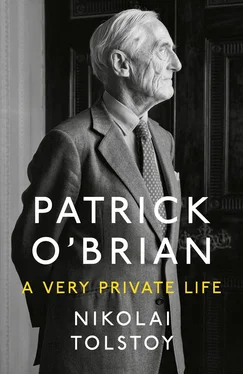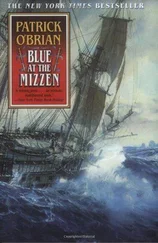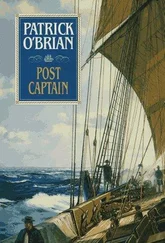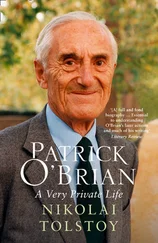However, the task was completed, and both were enthusiastic over the result. In May Patrick had toyed with the title Interested Motives , but eventually settled on The Catalans . My mother threw herself into typing the text, and on 2 October copies were sent to Harcourt Brace in New York, and Rupert Hart-Davis in London.
No sooner were the parcels despatched, than an anticlimactic reaction set in. On 5 November ‘Nervous tension over Catalans suddenly overwhelming. It matters so hideously.’ Might it suffer the same distressing fate as the collection of short stories, on which such high hopes had been pinned?
Three weeks passed by, during which they attempted to distract themselves with household improvements. ‘Wait, wait, wait, for post.’ Finally, on 26 November 1952, came news as good as might be hoped for. A telegram arrived from Naomi Burton at Curtis Brown in New York, announcing that Harcourt Brace had offered to take The Catalans at the same rate as Testimonies . Since the book was complete, they would shortly receive a second time within the year the princely sum of $750, tax-free!
Exultation reigned in the little apartement . ‘Very, very happy,’ rejoiced my mother. Patrick promptly wrote to Andorra concerning the building plot for which they had been negotiating. Then they jumped up, and ‘walked to P[ort]. Vendres without noticing the way’. My mother was ‘unable to resist giving P. gloves, camera (whose shutter won’t work & Patau [the photographer] is shut) & pineapple in tin. All these were for his birthday’ on 12 December. Three days later the contract arrived.
The book represents in many ways a tribute to the rugged land he had come to love, and its lively inhabitants. Among them they now had many fast friends, and were accepted as honorary Colliourenchs . It is the more fortunate, consequently, that the novel was not translated at the time into French or Catalan, since it included matter that must surely have provoked offence and dismay in some quarters.
The greatest pleasure I derive from Patrick’s novel lies in the exquisite evocation of Collioure (barely disguised as ‘Saint-Felíu’), and its stark hinterland of vineyards and mountains. Here is enshrined forever the old Collioure, before the destruction of ancient customs, language, clothing, music; the end of the fishing industry, and the building of rank upon rank of lotissements on the skirts of the town. Fortunately, enough of the old town survives in physical form for it to be possible to people it again in imagination, viewed in the light of Patrick’s loving recreation in The Catalans .
Several of his extended pen portraits are taken from the life. The account of the vendange in chapter VIII, with its vivid depiction of the toil involved, culminating in Alain’s climactic ‘rape’ of the lubricious Madeleine, drew extensively on Patrick’s own experience during those three backbreaking days in October 1951, when Odette’s provocative behaviour privately scandalized my mother. [fn17] Конец ознакомительного фрагмента. Текст предоставлен ООО «ЛитРес». Прочитайте эту книгу целиком, купив полную легальную версию на ЛитРес. Безопасно оплатить книгу можно банковской картой Visa, MasterCard, Maestro, со счета мобильного телефона, с платежного терминала, в салоне МТС или Связной, через PayPal, WebMoney, Яндекс.Деньги, QIWI Кошелек, бонусными картами или другим удобным Вам способом.
Again, the festival in the central place of the town, recounted in chapter IX, echoes the Carnival witnessed by Patrick in February 1952.
For the biographer the book contains much of interest. The figure of Dr Alain Roig, returning from long exile in the Far East to resolve a domestic crisis at home, stands (like Pugh in Three Bear Witness ) in material respects for Patrick himself. A detached, reflective outsider, he is concerned to observe and dissect the psychological turmoil by which he finds himself surrounded. At one point he ascends the town rampart, where he contemplates from on high the tumbled confusion of houses below:
He passed it carefully over in review, looking for changes and for known, personal landmarks. It was exactly as he remembered it, as he thought of it when he was away, exactly the same and yet with an additional strength of life, a vibrant immediacy: his memory, however sentimental with the distance, might not have provided the shrilling of the cicadas in the oleaster that grew tortuously from a crevice in the wall below, the play of the dancing, shimmering air, the flick and dart of the lizards, and the distant sound of men hauling on a boat.
This was what Patrick himself enjoyed, observing (at times with binoculars) the world from an inaccessible vantage-point, like the peregrine falcon in his adolescent short story of that title.
Familiar, too, from Patrick’s own experience are the internecine intrigue and feuding which Alain encounters among his family. The Roig family members represent in varying degree a dysfunctional collection, an affliction largely originating in the character of Alain’s deceased uncle: ‘an evil-tempered man, powerful, dom ineering, and restless; a ferocious domestic bully. It was not that Alain blamed his Uncle Hercule then; he accepted him as a force of nature and hated him without forming any judgment.’
All this is too close to Patrick’s experience of his oppressive father Charles Russ for coincidence, and the damaging effect he exerted in varying degrees on his offspring.
Alain’s return to Saint-Felíu arose from a summons to save his cousin Xavier, Uncle Hercule’s son, from what leading members of the family regard as a wholly inappropriate marriage. Alain himself ‘was sorry for Xavier … There was something very moving, in those days, in the sight of that proud, cold young man being humiliated and bully-ragged, and bearing it with a pale, masked fortitude.’
There can be no doubt that Xavier is a figure similarly deriving from Patrick’s character and experience, and the relationship between the dead father and his young son mirrors closely his own experience.
Perhaps the most damaging aspect of the bullying father figure is the way that the distorted relationship repeats itself in succeeding generations. Despite (or rather, because of) his harsh upbringing, Xavier in turn replicates the tyrant in his relationship with his own son Dédé. Although resolved at first to treat the child with the kindness his father never gave him, Xavier grows more and more dissatisfied with the boy, finding him intolerably weak, inadequate and sly. He tries educating Dédé himself, but the child’s foolish frivolity and sullen impertinence goad him into subjecting him to repeated beatings. While acknowledging that he had become the oppressor he so loathed in his father, Xavier confesses himself now incapable of acting otherwise.
This unsavoury episode unmistakably reflects both Patrick’s assessment of his own nature as a child, and his treatment of his son Richard, when he rashly attempted to tutor him in Wales in 1948–49. In this respect the experiment proved miserable for both father and son, as Patrick himself appears to have acknowledged following his arrival in France. What persuaded him to revisit that unhappy time, above all making Xavier excoriate his son in repellently disparaging terms? The explanation is, I suspect, that here as elsewhere Patrick utilized his writing on occasion as means of exorcizing his own shortcomings. He possessed no confidant beyond my mother, and even with her it seems unlikely that he found himself able to enlarge on actions he had come to regard with profound shame. He successively employed his three autobiographical novels ( Three Bear Witness , The Catalans and Richard Temple ) as vehicles for such confessions. The approach was presumably effective, as thereafter he appears to have felt he had effectively exhausted the theme. [fn18] Конец ознакомительного фрагмента. Текст предоставлен ООО «ЛитРес». Прочитайте эту книгу целиком, купив полную легальную версию на ЛитРес. Безопасно оплатить книгу можно банковской картой Visa, MasterCard, Maestro, со счета мобильного телефона, с платежного терминала, в салоне МТС или Связной, через PayPal, WebMoney, Яндекс.Деньги, QIWI Кошелек, бонусными картами или другим удобным Вам способом.
Читать дальше












